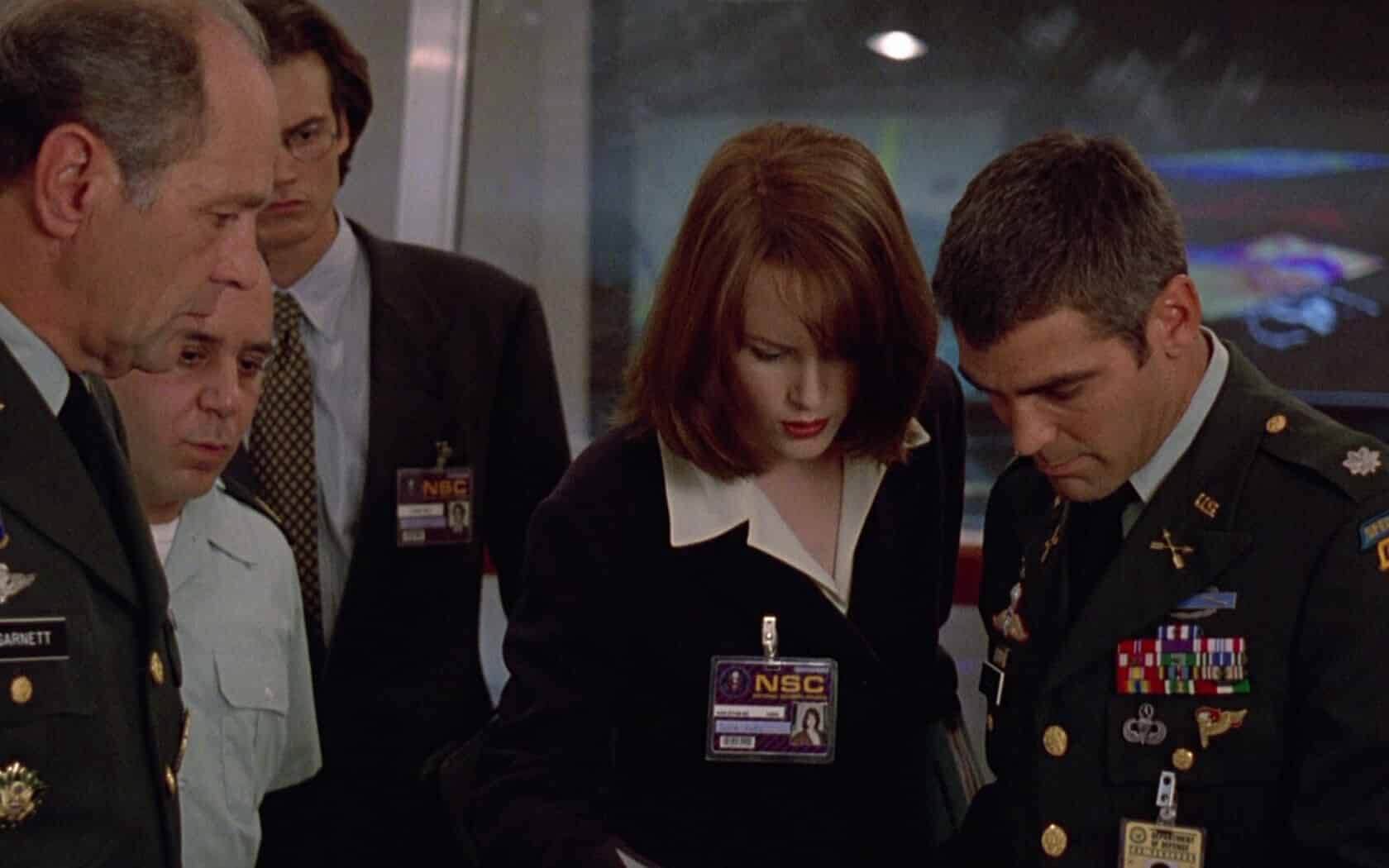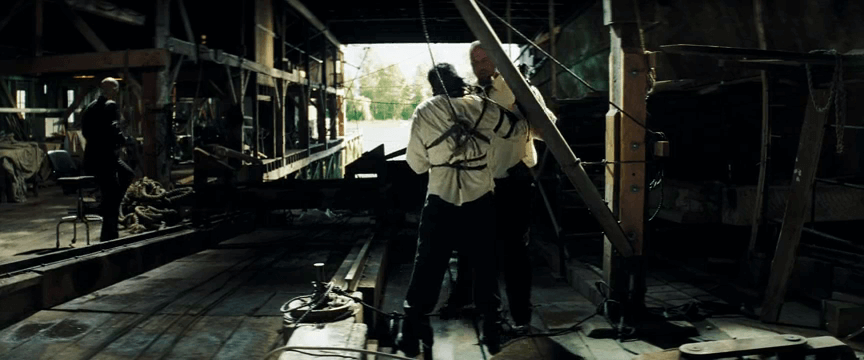As the co-authors of National Security Cinema, we have become known — rather inaccurately — for encouraging two major ideas: 1. That the government is really important in making movies more militaristic. 2. That Hollywood doesn’t produce dissenting films. While the first of these is somewhat true it is a simplification, the second is a falsehood.
The government is involved in as wide a range of entertainment projects as you can imagine, from video games to chat shows to blockbusters to docudramas. While many of these were militaristic from conception, before the government got involved, there is no doubt the Department of Defense (a.k.a. the Pentagon) has encouraged the militarization of popular culture and is pro-actively seeking further influence in Hollywood.
However, we want to emphasize that government support is by no means a prerequisite for Hollywood making militaristic movies. The sub-genre we have proposed — “national security cinema” — does not necessarily require the involvement of the actual national security apparatus in the production process.
National Security Cinema — Beyond the Government
Some of the examples are truly striking. Consider Rambo III (1988), set in the Soviet war in Afghanistan. The film demonized the Soviets and depicted our allies of the time, the Islamic Mujahideen, as heroic — albeit wild and stupid (in keeping with long-standing Hollywood stereotypes about Arabs).
This portrait is consistent with other films set in that war both before and since, such as the James Bond movie The Living Daylights (1987) and Charlie Wilson’s War (2007). While Rambo III did technically receive some support from the State Department, this did not affect the script, and the film very much reflected US government policy on steroids.
Similiarly, American Sniper (2014) was produced with no government support, despite being based on the autobiography of highly-decorated military sniper Chris Kyle. The Navy were approached in 2013 when Steven Spielberg was attached to direct but after DOD Hollywood liaison ‘Mr Strub received and reviewed script’ he ‘declined [the] project’. There were no script negotiations and no input from the entertainment liaison offices.

Of all the films we discuss in the media American Sniper is probably the most detested, since it weirdly heroizes a bona-fide real-world psychopath — but don’t forget that it came very much from Hollywood, not the Pentagon. Despite being rejected by the DOD and strongly condemned by some critics and audiences, American Sniper was nominated for six Academy Awards including Best Picture.

At the other end of the quality scale, in From Paris with Love (2010) James Reese is a low-level CIA operative who has never killed anyone before. He is assigned to a grizzled special agent played by John Travolta. Reese’s first task is to help Travolta smuggle a gun through French customs. Travolta shoots several terrorists who work at a seemingly innocent madras restaurant and then blasts holes in the ceiling to reveal a load of drugs.
Reese learns that his fiancé is a ‘sleeper’ agent assigned to live with him and, although he does everything he possibly can to talk her down, she can ultimately only be stopped by Reese blowing a hole in her head. In the closing scene, Reese shows off his big new weapon and Travolta nods approvingly, as though the whole movie was building to some kind of weird advert for handguns, police brutality, and spousal murder — which it basically is.
Finally, consider The Peacemaker (1997), which is also remarkable but for different reasons. The film starred a notable anti-war activist (George Clooney), was the first film by liberal studio DreamWorks SKG and was based on the book One Point Safe, by journalists Andrew and Leslie Cockburn. Between them, the Cockburns had authored books that were critical of the US-Israeli relationship, the US secret war in Nicaragua, and Bush-era Secretary of Defense Donald Rumsfeld.
Nevertheless, The Peacemaker went out of its way to emphasize how the US values the sanctity of civilian life — even when George Clooney’s character insists that a marksman shoot a terrorist to prevent a nuclear explosion in New York, he still does not do so because a child is nearby.

Director Mimi Leder commented that ‘we are a vulnerable world and we need to protect ourselves. That is a message I hope gets across with the film.’ On such terms, The Peacemaker succeeds — it does indeed indicate that we need to ‘protect ourselves’ from the entire Middle East, particularly Iraq (which Clooney prevents acquiring chemical weapons) and Iran.
The solution implicitly advocated is targeted state-sanctioned violence, including the violation of Russian airspace. It becomes clear that Leder really means that the US is ‘the peacemaker’ in her title and there is precious little indication that she is being ironic. Again, neither the Pentagon or CIA was involved.
What about the Dissenting Bits in these Films?
As to dissenting or radical films, again the picture is more complex than blanket statements allow. Even state-sponsored products often contain material that ridicules or criticises the establishment. Iron Man contains a scene where the protagonist, Tony Stark, lambasts the military-industrial complex and the corruption of the arms industry.
Transformers II features a conspiracy theorist character who insists (correctly — in the film) that the government is covering up the existence of extra-terrestrial giant robots.
Goldeneye includes a sardonic joke where M says, ‘Unlike the American government, we prefer not to get our bad news from CNN.’ All three of these productions were supported by the Pentagon, who had line-by-line veto power over the scripts.
Along similar lines Shooter (2007) and the TV remake (2016) both feature a conspiracy to frame an ex-military sniper for an attempted assassination on the US President. Both the film and TV versions include a device that can be used to fake a suicide by gunshot.
In the film, this is used by the conspirators to try to murder an FBI agent and make it appear as though he shot himself. Despite this the FBI supported the production and even boasted about doing so on their website. The TV remake of Shooter, which also features a suicide device in one episode, appears to have been supported by the CIA.

However, these are moments of limited effect rather than serious, lasting criticisms of the state that resonate with audiences after the film is over. The overall content of these films is unerringly pro-government and pro-war, even if they contain some argument over exactly how those wars should be fought.
This propaganda strategy is more subtle than the blaring, shallow efforts of more openly oligarchic countries, and is summed up by an entry in the DOD’s Hollywood database. The 1941 movie Dive Bomber was supported by the Navy as a ‘preparedness film’ for WW2. Even though ‘some people objected to the death of some pilots as bad image making’ the Navy argued ‘if film only showed positive side, it would be labeled propaganda.’
In order to effectively disguise state propaganda as even-handed or apolitical entertainment, limited criticism and/or negative portrayals are allowed.
Anti-War Films and the Cinema of Dissent
Outside of the government-assisted realm, Hollywood does produce a reasonable number of films where the overall content is critical of the state and not just the occasional moment in the midst of a pro-state narrative. The East (2013) was produced by Fox Searchlight but was based on director Zal Batmanglij and star Brit Marling’s real experiences practicing freeganism in the summer of 2009. Marling commented:
We learned to hop trains, we learned to sleep on rooftops, we learned to claim the space that feels so private. We joined this anarchist collective.
The film centers around an eco-anarchist group called The East, who carry out highly-skilled ‘jams’ against corporate leaders, ranging from filling one executive’s house with crude oil to poisoning the board of a military-associated pharmaceutical company with their own drug.
While the morality of The East’s actions is called into question, particularly when one of their group is shot dead by armed guards, the immorality of their targets is not in dispute. Marling stars as an undercover agent working for a private intelligence company, who infiltrates The East but is drawn in by their radical ideology and the bravery of their operations.

The East garnered strongly positive reviews but opened in only four theaters. While this was rapidly expanded once the film proved popular with audiences, it peaked at 195 theaters in its fourth week before trailing off. This limited distribution saw it take only $2.4 million worldwide against a $6.5 million budget.
For comparison, the Will Smith blockbuster After Earth opened the same weekend in over 3,400 theaters, helping this poorly-reviewed and unoriginal action flick to take nearly $250 million worldwide. Despite averaging around twice the revenue per theater that After Earth attained, The East was given a shorter run, in far fewer cinemas, resulting in a loss for the film that was far better received by both audiences and critics.

Kill the Messenger (2014) suffered a similar fate. Producer and star Jeremy Renner was so keen to make a film about the life of journalist Gary Webb, and his exposé on the CIA’s involvement in drug-running, that he formed his own production company and invested his own money. Renner explained that the big studios ‘weren’t throwing money’ at films like Kill the Messenger, and so:
In order to protect my career and have quality control of the material I was wanting to do, I started a company that would either develop the material or be out there looking for material that is going to want me to go to work, to be challenged.
Like The East, Kill the Messenger is partly an homage to the great conspiracy thrillers of the 1970s, charting Webb’s exploration of who was behind the Los Angeles illegal drug industry, the resulting character assassination inspired by the CIA, and his eventual suicide years later. It was received well by critics and audiences, but the distribution and marketing company Focus Features screwed up its release. While the film opened in a respectable 374 theaters this was down to 211 in week three and only 75 in week four.
An online petition drew attention to the fact that the film received more promotions six weeks into its run, by which point it was only in 18 theaters than it did before its release. Comparisons were made with another Focus Features-distributed film that was released at the same time, The Theory of Everything. Focus granted this apolitical biopic of Stephen Hawking over six times the number of TV promos that they gave to Kill the Messenger.
While The Theory of Everything peaked at over 1200 theaters and had a 23-week run, Kill the Messenger peaked at just 427 and had a nine-week run. As a result, The Theory of Everything took over $35 million domestically (and a further $87 million worldwide) against a $15 million budget, resulting in a healthy profit. Meanwhile Kill the Messenger took under $2.5 million against a $5 million budget, and was only released in the US, resulting in a loss.

Other recent films that center around stories that are critical of the establishment include Lord of War (2005), The Hurt Locker (2008), Che(2008), Green Zone (2010) and Good Kill (2014). Some of these more radical films have been produced by major studios, but as Renner put it:
Warner Bros. will make maybe one of those movies in a year, and then they’ll go on and make Batmans and all these other things. The same with every other studio.
The majority of dissenting films are lower-budget, limited-release productions that most people never even hear about. Lacking the distribution and marketing of much bigger films, their perspectives are marginalized largely by industrial mechanisms, for industrial reasons.
Hollywood is a Broad Church
Overall, then, Hollywood is a broad church when it comes to politics. But it is still a church. Its architecture is longstanding and has deep foundations. Dissent exists but typically it is tepid, almost invariably ignored, and may be punished. The bishops are the heads of the media monopolies flanked by their national security clergymen.
It is fitting that the word ‘propaganda’ stems from eighteenth-century Catholicism, where the Cardinals ‘propagated the faith.’ Modern audiences are the new congregation, supplied with a constant diet of miracles and moonshine.
But our recommendation is not that Hollywood should be making more critical films. Some of our own favorite films are as far removed from politics as anyone can imagine. No — our concern is simply that there should be much less national security cinema
How can this be best achieved? The general public have a lot of power to ‘vote with their money’ and support fringe and radical films more and national security cinema less. This would force the industry to respond to market demand and give wider distribution to the more radical films.
When it comes to government-sponsored films there are two simple reforms that could be adopted:
(1) The government should be required by law to make their files on Hollywood cooperation open to the public.
(2) Studios should explicitly declare any cooperation in the opening credits of their films, television shows, and video games.
We suspect that this would spell the end for national security entertainment, as viewers turn off material that they will much more readily recognize as propaganda.
Until that day, with Hollywood as America’s dream factory, we will continue to live and die in a military-industrial nightmare.
Top Photo | A screenshot from the blockbuster film Saving Private Ryan.
This article is adapted from the final chapter of National Security Cinema: The Shocking New Evidence of Government Control in Hollywood.
Dr. Alford is a Teaching Fellow in the Department of Politics, Language and International Studies at the University of Bath. His documentary film based on his research, The Writer with No Hands, was premiered in 2014 at Hot Docs, Toronto. He is the co-author of the new book Union Jackboot: What Your Media and Professors Don’t Tell You About British Foreign Policy.
Tom Secker is a British-based writer who covers the security services, Hollywood and the history of terrorism. He runs the SpyCulture blog which can be supported via Patreon.com. His work has been covered by The Mirror, The Express, Salon, TechDirt and elsewhere.
Source | Insurge Intelligence


